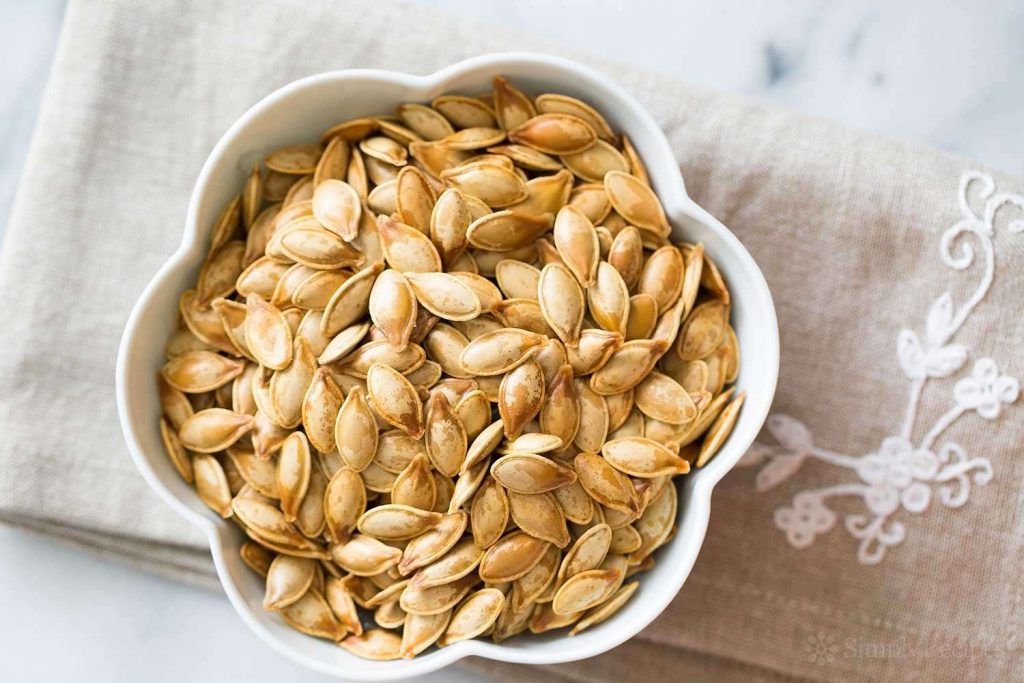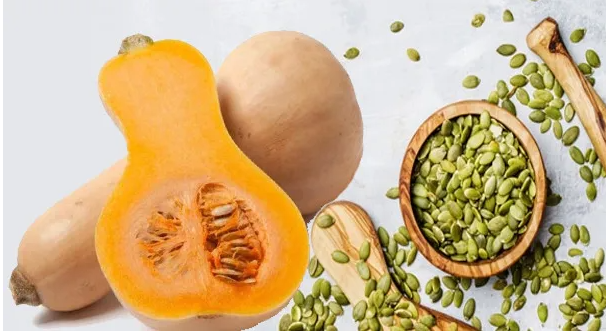Pumpkin seeds, also called pumpkin pulp, may be small, but they are actually packed with valuable nutrients. And eating just a small amount of them can provide you with a large amount of healthy fats, magnesium and zinc. For this reason, pumpkin seeds have been associated with many health benefits, including improved heart health, prostate health and protection against certain cancers.
Valuable Nutritional Of Pumpkin Seeds
These seeds are rich in essential nutrients for the body, as 30 grams of pumpkin seeds contain the following according to the United States Department of Agriculture (USDA):
| protein | 7 g |
| Fat | 14 g |
| Carbohydrates | 4 g |
| Dietary fiber | 0.99 g |
| Iron | 2.7 mg |
| Sodium | 5.1 mg |
| Vitamin A | 99.9 IU |
They also contain plenty of antioxidants and an appropriate amount of polyunsaturated fatty acids, potassium, vitamin B2 (riboflavin), and folate.
Moreover, pumpkin seeds and the oil extracted from them also contain many other nutrients and plant compounds that have been shown to provide health benefits.
Pumpkin seeds benefits

Rich in antioxidants:
Pumpkin or pumpkin seeds contain antioxidants such as carotenoids and vitamin E. Antioxidants can reduce inflammation and protect your cells from harmful free radicals. That’s why consuming antioxidant-rich foods can help protect against many diseases.
In one study, pumpkin seed oil reduced inflammation in mice with arthritis without any side effects, while animals that took the anti-inflammatory drug experienced adverse side effects.
Improve prostate and bladder health:
Pumpkin seeds may help relieve symptoms of benign prostatic hyperplasia (BPH), a condition in which the prostate gland enlarges, causing problems urinating. Several studies in humans have found that eating these seeds reduces BPH-related symptoms. In a one-year study of more than 1,400 men with BPH, consumption of pumpkin seeds reduced symptoms and caused improved quality of life.
Further research suggests that taking pumpkin seeds or pumpkin products such as supplements can help treat neurogenic bladder symptoms. A study of 45 men and women with overactive bladder found that taking 10 grams of this seed extract daily improved urine function.
Pumpkin seeds are very rich in magnesium:
Peeled pumpkin seeds
Pumpkin or pumpkin seeds are one of the best natural sources of magnesium, a mineral often lacking in the diet of many developed Western countries.
For example, in the USA, about 79% of adults have a magnesium intake below the recommended daily amount.
In fact, magnesium is essential for more than 600 chemical reactions in your body. For example, adequate magnesium levels are important for:
Control blood pressure.
Reduce the risk of heart disease.
Shaping and maintaining bone health.
Regulation of blood sugar levels.
Eating pumpkin seeds improves heart health:
Pumpkin seeds are a good source of antioxidants, magnesium, zinc and fatty acids – which may help keep your heart healthy.
Animal studies have also shown that pumpkin seed oil may reduce high blood pressure and high cholesterol levels – two important risk factors for heart disease.
A 12-week study in 35 postmenstrual women found that pumpkin seed oil supplementation reduced diastolic blood pressure by 7%, and increased HDL cholesterol levels by 16%.
Other studies suggest that pumpkin’s ability to increase the generation of nitric oxide in your body may be responsible for its positive effects on heart health. Nitric oxide helps dilate blood vessels, improve blood flow, and reduce the risk of plaque buildup in the arteries.
Rich in fiber:
Pumpkin seeds are a great source of dietary fiber, providing 1.1 grams of fiber in one 28-gram serving.
A high-fiber diet has always been associated with promoting digestive health. In addition, high-fiber diets have been associated with a lower risk of heart disease, type 2 diabetes and obesity.
Useful for hair and skin
Pumpkin seeds contain antiandrogenic substances that act on hair loss. Also, the presence of copper works to prevent the price from falling and strengthening it and activating the melanin pigment, which makes the hair appear darker. The presence of fatty acids, especially omega-3s, enhances hair hydration and makes it shinier. As for the skin, it is a good source of moisturizing squalene for the skin, and there are many substances that help the formation of collagen, which makes you look more youthful.
Eating pumpkin seeds may improve sperm quality:
Low zinc levels are associated with lower sperm quality and an increased risk of male infertility.
Because pumpkin seeds are a rich source of zinc, sperm quality may improve. Evidence from a study in mice suggests that it may also protect sperm from damage caused by chemotherapy and autoimmune diseases.
Additionally, pumpkin seeds are also rich in antioxidants and other nutrients that can contribute to healthy testosterone levels and improve overall health.
All of these factors combined may enhance fertility levels and reproductive function, especially in men.
May help improve sleep:
If you have trouble sleeping, you may want to eat some pumpkin seeds before bed. It’s a natural source of tryptophan, an amino acid that can help promote sleep. Consuming about 1 gram of tryptophan per day is thought to improve sleep quality. However, you will need to eat about (200 grams) of pumpkin seeds to achieve the required amount of tryptophan.
Regulation of blood sugar level
Studies targeting animal models have revealed that pumpkin seeds can reduce high sugar levels in the body, especially for those with diabetes or problems controlling their sugar level.
Seeds contain high levels of magnesium may be the reason behind this benefit, in one study it was found that a diet rich in magnesium reduces the risk of diabetes.
Read more about benefits of watermelon .
